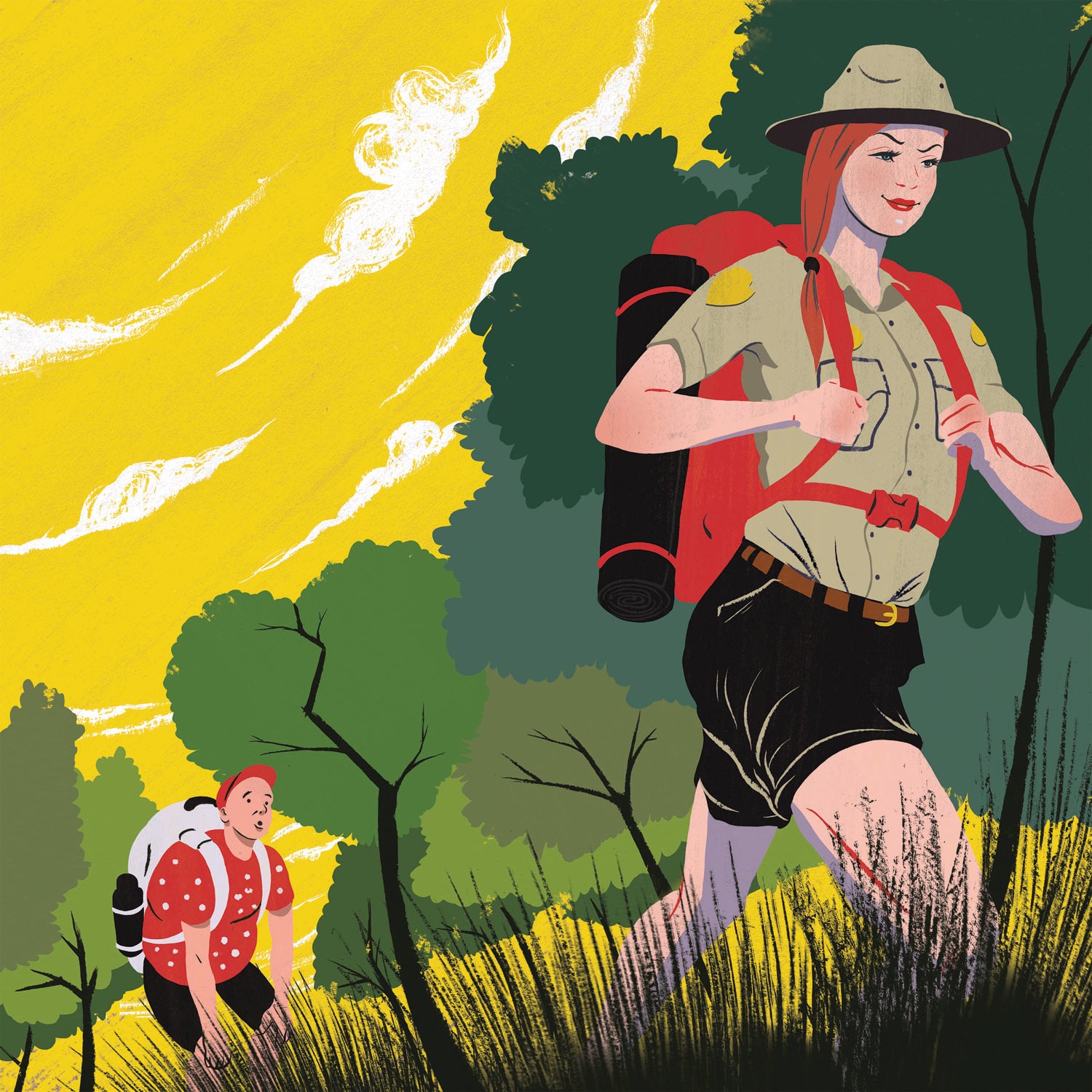Getting Revenge in Denali National Park

'Illustration by Ryan Garcia'
Forrest had gotten fat. I know it sounds cruel, but that’s what I thought when I saw him at the airport in Anchorage, Alaska.
I’d driven four hours from Denali National Park, with dual sensations duking it out inside of me: titillation, to see the only guy I had ever truly loved, and neck-tensing anxiety, because the last time Forrest and I had been together—two years prior—we imploded.
We’d dated on and off since junior high, and I’d always felt his adoration for me vacillated based on my weight. Truth: He’d always seemed more adoring when I was thin than when I’d packed on a few.
I was a chubby kid, a “big-boned” adolescent. But at 19, I learned that long, uphill hikes paired with strenuously reduced caloric intake could make me “muscular thin.” In the years since, through hiking and not eating, I’d whittled myself into “wiry.” Along the way, I’d also logged enough time on trails to land a job as a Denali backcountry ranger. When I called Forrest the summer I started, I fantasized about him coming to the park, seeing the strong, thin me and swooning in unrequited worship. Why unrequited? Vengeance was welling inside of me.
I’d take him on the hardest backcountry patrol in the park, the three-night, 18-mile, willow-clogged, river-threaded, wolf-and-grizzly-bear-teeming Sanctuary River Loop. I’d prove how empowered I had become without him.
We drove back to Denali in twilight, and, the following day, readied ourselves for the trip. But in the flush of vengeance, I made two tiny mistakes. I packed water bottles and a stove, but no water purification tablets and no lighter.
We rode the bus to the Sanctuary drop-off and started hiking. In full peacockery, and fueled by years of resentment, I began speed-hiking up the valley. Poor Forrest—who’d never negotiated Denali’s tussock-stacked, squishy, trailless tundra—lagged farther and farther behind. He seemed weak, and that made me stronger. I took off, blazing even faster. I’d turn back, “check in,” and blast off again.
Well, hiking like this makes you thirsty, which is when I realized my oversight. Though water sources abounded, I had no way to purify. I can still boil, I thought. And that’s when I realized my second mistake. I couldn’t even do that, nor, without flame, cook us dinner. I waited for Forrest, and simultaneously gave him the news and brushed it aside. We didn’t really need to eat anyway, I told him, then mentioned that maybe our best choice—given circumstances “beyond my control”—would be to abandon the trip. Off I stormed again, with something less than peacockery, telling Forrest I’d wait for him at the edge of the Sanctuary River.
That was a lonely 3 miles. Not only had I failed to demonstrate my leadership and strength, I’d managed to spike the entire trip. I made it to the edge of the Sanctuary, sat, waited, and thought about what I’d have to say to him when he caught up.
Minutes passed, maybe even an hour. As night began to fall, I pictured all sorts of fates for poor Forrest: him tripping on a tussock, grizzlies gnawing on his buttock. Not only had I—a ranger—lost my volunteer, but I was flirting with maybe losing my nerve, too. There was no way I could find him by myself in the brushy terrain without help, so I made the very non-rangery decision to cross the Sanctuary River—alone—so I could hike the most familiar way out in the last light.
I plunged in, nearly losing my footing and submerging to my chest near the opposite bank, hauled myself up, hiked the few miles to the park road, and hitched a ride to a nearby campground. The host called my boss, who initiated a search. All my fellow rangers fanned out, searching the tundra for Forrest. I wanted to search, too, but I was too wet and too distressed to be much help, and instead shivered in the campground host’s trailer.
In the span of one day, I’d gone from femme Denali ranger to bumbling rookie, a danger to myself and others, especially Forrest, who was alone at the mercy of the bears and wolves.
But Forrest didn’t need mercy.
After I’d ditched him one time too many, he ditched me back.
Instead of following me, he found his own way back to the park road, flagged down a backpacker bus, and had it drop him at my Park Service cabin. When the search party finally found him the next morning, he was warm and happy, indulging in his second king-size Snickers.
That one should have been mine, but I think I already got what I deserved.
Tracy Ross and Forrest parted ways amicably. She met her husband on a mountain a few years later.